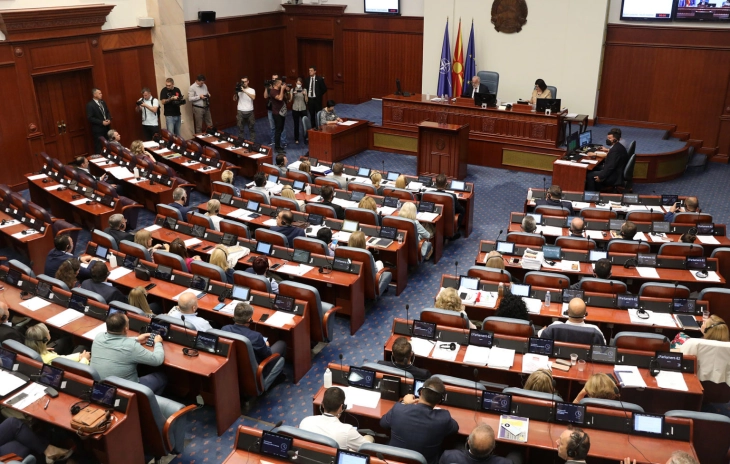MPs have capacity to make decision on country's EU membership, says Kovachevski
- The decision on the constitutional amendments refers to the country's European future and we need it, as other decisions that will follow in the coming period on the path to full-fledged EU membership, Prime Minister Dimitar Kovachevski said during Tuesday's press conference at the Government in response to a reporter's question about the process of changing the Constitution.
- Post By Nevenka Nikolik
- 18:29, 18 April, 2023

Skopje, 18 April 2023 (MIA) - The decision on the constitutional amendments refers to the country's European future and we need it, as other decisions that will follow in the coming period on the path to full-fledged EU membership, Prime Minister Dimitar Kovachevski said during Tuesday's press conference at the Government in response to a reporter's question about the process of changing the Constitution.
"The process will start. The names of the experts from the political parties have already been released. In the coming days, the Minister of Justice will announce the experts who come from the field and the area of constitutional law and related rights. Thus, the process will begin with practical preparation of the proposed amendments that should then be in Parliament, where the Constitutional Commission later continues, as well as plenary sessions, in accordance with the law and the Constitution," said Kovachevski, adding that there are 120 MPs in the Parliament who can fully decide on matters within their competence.
He stressed that EU membership is the country's strategic goal, and all research shows that a dominant number of citizens are in favor of the country's membership in the Union, because there is no alternative.
"Those who are against EU membership don't offer an alternative. That's why I believe that the MPs have the capacity, both democratic and strategic, as well as vision, to make a decision, one in a series of decisions, on our country's EU accession, because it is a process for the citizens. We must know that EU accession is not a process of one person, not a process of one political party nor a process of one government. It is a process of the whole society," Kovachevski added.

Commenting on VMRO-DPMNE's position that to them the constitutional amendments are "a done deal", the PM noted that joining NATO was also a done deal for the party, but still the country became a NATO member.
"They also considered the French proposal "a done deal", they organized demonstrations in front of the Parliament, and then the Parliament passed the conclusions with which we started the EU negotiations. We called on the opposition to take part in the working groups since day one of the screening process, but they didn't want to take part," Kovachevski added.
The PM pointed out that from day one of the start of the negotiations with the EU, the Government had announced that all decisions made will be shared and explained at the National Council for European Integration, which is headed by an MP from the opposition, so that everyone can be included in the process.
According to him, that is exactly why working groups are set up, so that all proposals from the political parties can be discussed in terms of the social, political and historical situation in the country.
"That is why expert groups are formed which also include political representatives in order to reach a solution that will best correspond to the Macedonian model, by which we will become an EU members," Kovachevski said.
He added that it has been no coincidence that, together with Deputy PM for European Affairs Bojan Marichikj, they have called on the opposition since day one to be included through its own experts in the working groups because European integration will be a long process.
"The process will last until 2030 when we become an EU member state. We have had obstacles so far. If any country had a difficult path joining NATO and the EU, it was our country. You remember what decisions and compromises we had to make in order to join NATO and start negotiations with the EU. This is the first time that the obstacle doesn't come from outside, but the obstacle is from the inside in terms of moving EU negotiations forward," Kovachevski added.
The PM stressed that he wouldn't like to think about a scenario where the country won't continue the path to the EU.
"And that's why I believe our country has shown throughout history that it has the capacity to make decisions that mean a better future for the citizens. This is what the citizens want and I would also say that all political parties have that responsibility, regardless of their ideology, regardless of whether they are in power or in opposition, given that this decision is for the citizens. A lot of work is yet ahead of all of us, regardless of political or any other affiliation, in order to fulfill the criteria of the EU to full-fledged membership," said Kovachevski.







